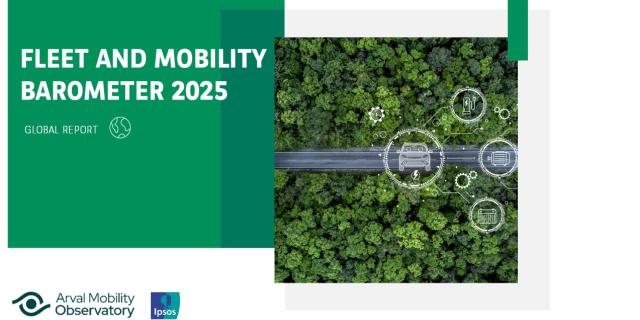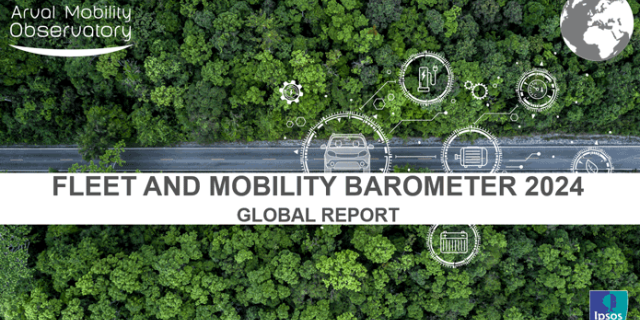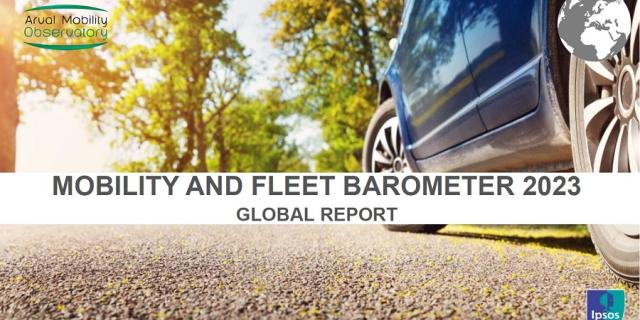Rueil-Malmaison, December 6th 2022
The Arval Mobility Observatory undertook an independent study in cooperation with Ipsos on Employee mobility, current practices and expectations of employees regarding their company’s mobility offers. More than 2900 employees were surveyed across 6 European countries between the 1st and the 11th of September 2022. This survey demonstrates that offering mobility solutions to employees is a way for companies to improve attractiveness and benefit in terms of talent retention.
1. Whatever the type of journey, driving remains the central means of transportation
The Covid-19 pandemic has impacted transportation habits: The most mentioned remain the increase of homeworking (47% of employees) and the decrease in frequency of business trips (42% of employees). As a result, currently 60% of employees work remotely or from home at least one day per week with an average of 1.9 days per week, so commuting remains very present. Whatever the motive behind travelling (commuting or business trips), driving is still the predominantly used means of transportation (71% for commuting employees and 49% among employees on business trips).
At present, travel time, comfort and accessibility of the means of transportation are the main criteria to choose their current commuting transportation mode. Whether it be for commuting or business travel, there is a consensus on the ideal characteristics of transport means in terms of travel time, proximity, flexibility and safety. Comfort and cleanliness are favored for business travel, whilst price is preferred for commuting.
2. Companies still have room for improvement in terms of implementation of their mobility service offer
Only 59% of all surveyed employees have at least one mobility service offer within their company. The most common offers are a private parking space provided by the company (21%), partial coverage of public transport expenses (20%) and company cars. On average, employees have access to 2.2 mobility services.
Belgium and the Netherlands are the most developed in terms of offering mobility solutions to employees: In Belgium, 80% of employees have at least one mobility service offered within their company and 75% in the Netherlands, with an average of 2.5 mobility services offered.
3. As a result, companies’ mobility offer is not yet considered sufficient by their employees
Less than half of all surveyed employees use at least one mobility service. Their companies either don't propose any service, the offer is not appropriate or does not meet their needs.
As a result, 55 % of all surveyed employees are not convinced by their company’s mobility offer. The level of satisfaction correlates with the amount of mobility service offers: in the Netherlands and Belgium where the number of mobility services proposed is higher, the level of dissatisfaction is much lesser: 37% of employees in the Netherlands and 49% in Belgium.
4. However, employees have high expectations in terms of mobility regarding their companies
92% of employees would appreciate at least one mobility service to be provided or to be maintained by their company, the most requested being a mobility budget and a company car with related services: 76% of employees have expectations concerning partial coverage of energy fuel expenses, 73% regarding mobility budget, 72% for partial coverage of public transport expenses.
Besides, only 54% of employees are confident in the fact that companies in general will increase the range of their mobility offers in the next 5 years. Throughout the selection of mobility offers provided to their employees, companies have a responsibility to drive energy transition. Sustainability is something that is not highlighted by employees as an important criterion of choice for their commuting transportation mode. Indeed, low impact on environment comes in 10th position on their ranking choice. So companies have a key role to play as they are real prescribers in terms of energy transition and sustainability.
5. Companies’ mobility offer is a clear driver of employee attractiveness
Mobility is an important factor for employees when choosing their company. 66% of employees consider that the mobility solutions offered by their future companies to be an important criterion. This requirement is important for 76% of employees who plan to leave their jobs in the upcoming 6 months.
The proposal of mobility solutions increases strongly employer attractiveness. Mobility budget and company cars are the most appealing to employees. Respectively 82% and 78% of employees think that a company would be more attractive if mobility budget and company cars were a part of a job’s package.
“This unique Employee Mobility Survey is clearly showing us the high expectations of employees regarding employer mobility offers. Companies have room for improvement in terms of implementation of proposed mobility service offers. But what is important above all is the relevance in the selection of this offer. If they do the right choice and answer their employees’ needs, it will be a key differentiator for them in terms of attractiveness. On top of that, companies will play a key role as a prescriber in offering sustainable mobility solutions”, said Yaël Bennathan, Head of Arval Mobility Observatory.
Methodology
For this independent survey, 2 905 employees in private companies with more than 100 employees interviews were carried out between September 1, 2022 and September 11, 2022 by an independent research company Ipsos. Participants have completed the survey online. Its scope (6 countries) includes Germany, Belgium, Spain, France, Italy and the Netherlands;
The distribution of the interviewees were as follows:
- 57% of women, 43% of men
- 6% between 18 and 24, 57% between 25 and 49, 36% between 50 and 60 years old
- 98% of employees interviewed are commuting and 55 % do business trips.
- 62 % need less than 30 minutes and 57% less than 20 kms to commute every day.













